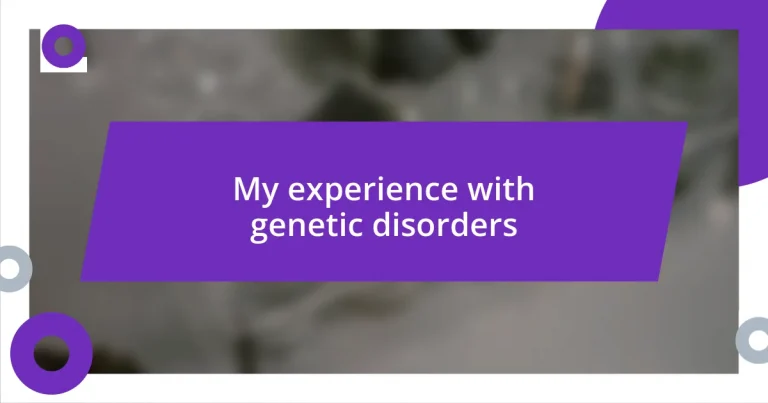Key takeaways:
- Genetic disorders can have profound impacts not only on individuals but also on families and communities, highlighting the importance of empathy and support.
- The diagnosis and treatment journey for genetic disorders is complex, requiring a blend of medical understanding and emotional support from networks that share experiences.
- Coping strategies such as breaking tasks into manageable pieces, establishing routines, and practicing mindfulness can significantly improve daily life for those living with genetic disorders.
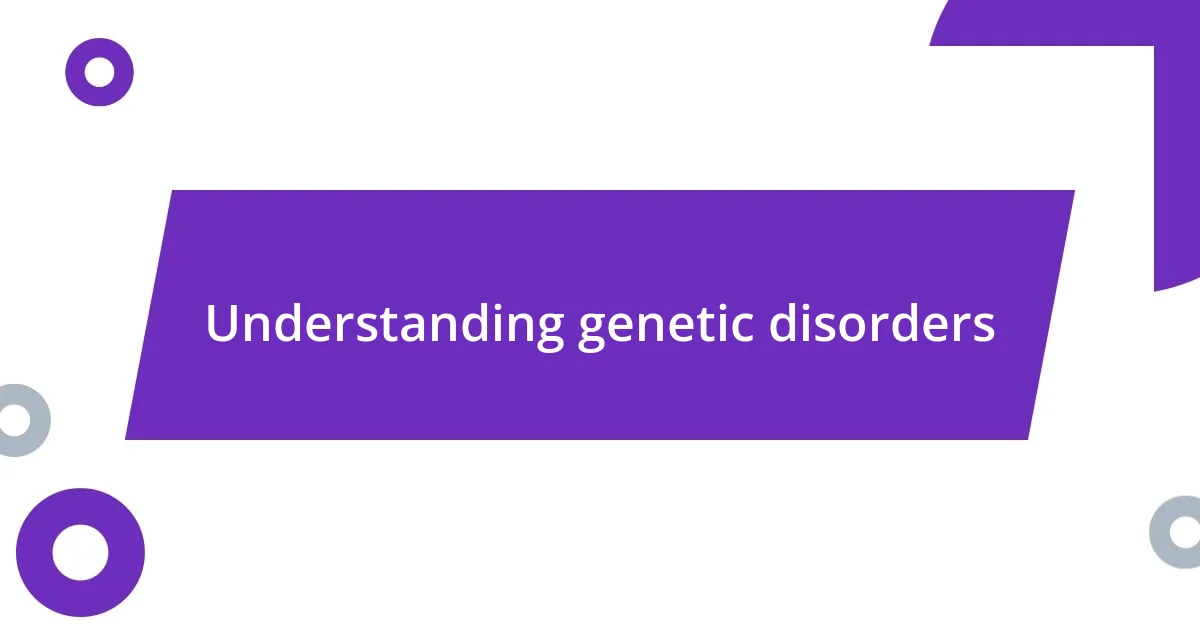
Understanding genetic disorders
Genetic disorders stem from abnormalities in our DNA, which are the blueprints for our biological makeup. I remember the moment I learned about inherited conditions during a family gathering. It sparked a conversation about my grandfather’s battle with Huntington’s disease and made me wonder: How much of our health is written in our genes?
As I delved deeper into the topic, I found that genetic disorders can be inherited from one or both parents, which led to an insightful discussion with a friend whose family has a history of cystic fibrosis. It’s fascinating how a single gene mutation can have such profound effects on health. Isn’t it intriguing how intertwined our lives are with this genetic code, sometimes unaware of the potential implications?
The emotional toll of genetic disorders extends beyond the individuals affected; it reaches families and communities. For instance, a close friend shared the heartache of genetic testing, where they faced the uncertainty of carrier status for sickle cell anemia. It made me realize how crucial understanding these disorders is—it’s not just about the science; it’s about empathy, support, and the shared human experience.
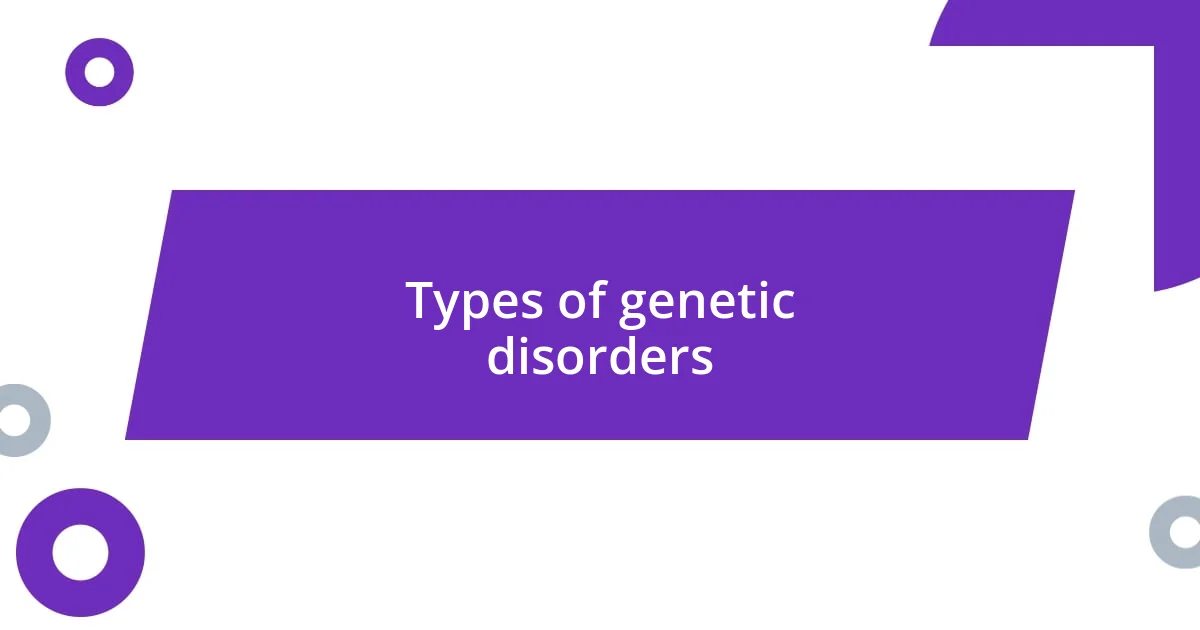
Types of genetic disorders
Genetic disorders can be broadly categorized into three main types: single-gene disorders, chromosomal disorders, and multifactorial disorders. Single-gene disorders, like cystic fibrosis or sickle cell anemia, arise from mutations in individual genes. I recall speaking with a cousin who bravely faces the challenges of living with a single-gene disorder; her story underscores how these conditions often shape daily life and relationships.
- Single-gene disorders: Caused by mutations in one gene (e.g., cystic fibrosis, sickle cell anemia).
- Chromosomal disorders: Involves defects in chromosomes, such as Down syndrome, which results from an extra copy of chromosome 21.
- Multifactorial disorders: These include conditions like heart disease or diabetes, which are influenced by multiple genes and environmental factors.
On the other hand, chromosomal disorders often present unique challenges. I think about how families adjust when a child is diagnosed with a chromosomal condition. The support systems they build can be incredibly inspiring. Finally, multifactorial disorders are particularly interesting because they involve a complex interplay of genetics and environment, reminding me of conversations I’ve had about lifestyle choices influencing health. Understanding these types can help us recognize the diversity of genetic disorders and their impact on both individuals and families.
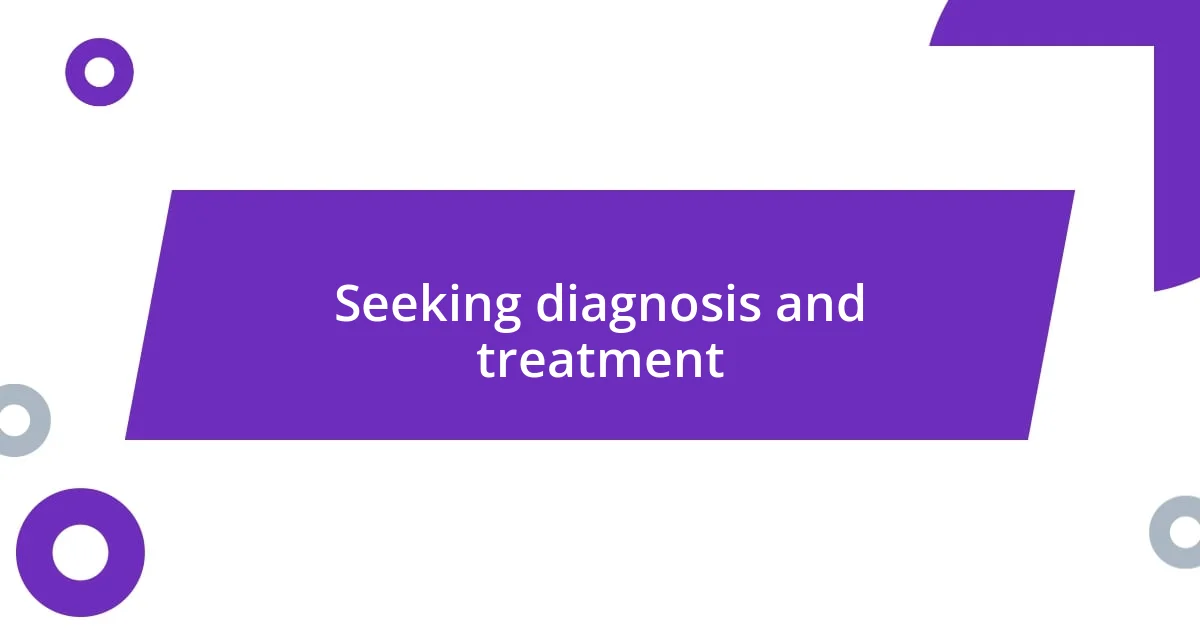
Seeking diagnosis and treatment
When I first sought a diagnosis for a potential genetic disorder, I was overwhelmed by the labyrinth of information and emotions. It felt like every step involved endless paperwork and medical jargon that left me scratching my head. During my visits, I remember one doctor who took the time to explain not just the tests we were considering, but also what each result could potentially mean for my family and me. This personal approach made all the difference; it helped me feel less like a collection of symptoms and more like an individual working towards clarity.
After receiving my diagnosis, the conversation shifted to treatment options. I vividly recall one evening discussing potential therapies with a genetic counselor. The sense of hope that emerged from those discussions was palpable. Real-world experiences with treatment can vary significantly; some individuals may find effective management strategies, while others grapple with their conditions daily. This acknowledgment of the human experience behind every diagnosis transformed my perspective on the healthcare journey.
Finding the right support network was also crucial. I discovered various groups, both online and in person, where people shared not just their challenges but also their triumphs. Hearing stories from others who had navigated similar paths really lifted my spirits. The emotional burden of seeking diagnosis and treatment can be heavy, but connecting with others helps lighten that load. In many ways, this journey has forged a stronger bond with my family and friends, shaping our collective approach to health and wellness.
| Aspect | Details |
|---|---|
| Diagnosis Process | A complex journey often requiring genetic testing and consultations with specialists. |
| Treatment Options | Varies greatly; can include medication, therapy, or lifestyle changes, depending on the disorder. |
| Support Systems | Crucial for emotional health; often includes family, friends, and support groups sharing experiences. |
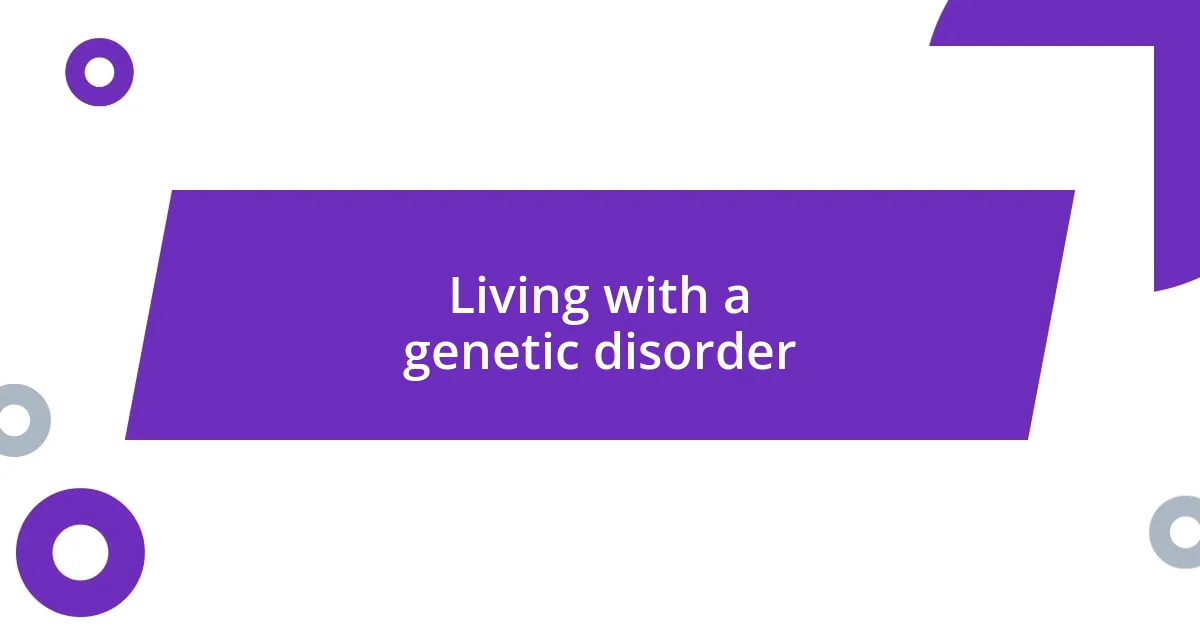
Living with a genetic disorder
Living with a genetic disorder presents a unique mix of challenges and growth. I remember the countless days spent grappling with fatigue and discomfort, often wondering how I would manage my daily tasks. It’s a humbling experience; it forces you to embrace both your limitations and your strengths in ways you never expected.
Navigating social interactions can also be tricky. There were moments at gatherings when I felt isolated, even among friends who wanted to understand. It was through open conversations about my condition that bridges were built. Those heart-to-heart discussions not only fostered empathy but also encouraged deeper connections. Have you ever had similar experiences where sharing your story has reshaped relationships?
On a more positive note, living with a genetic disorder has instilled a resilience in me that I didn’t know I had. I often find myself reflecting on the adaptive skills I’ve gained—like finding creative ways to cope with everyday challenges. The small victories, such as completing a task with persistence despite feeling unwell, provide immense satisfaction. It’s fascinating how these experiences shape our identities, isn’t it?
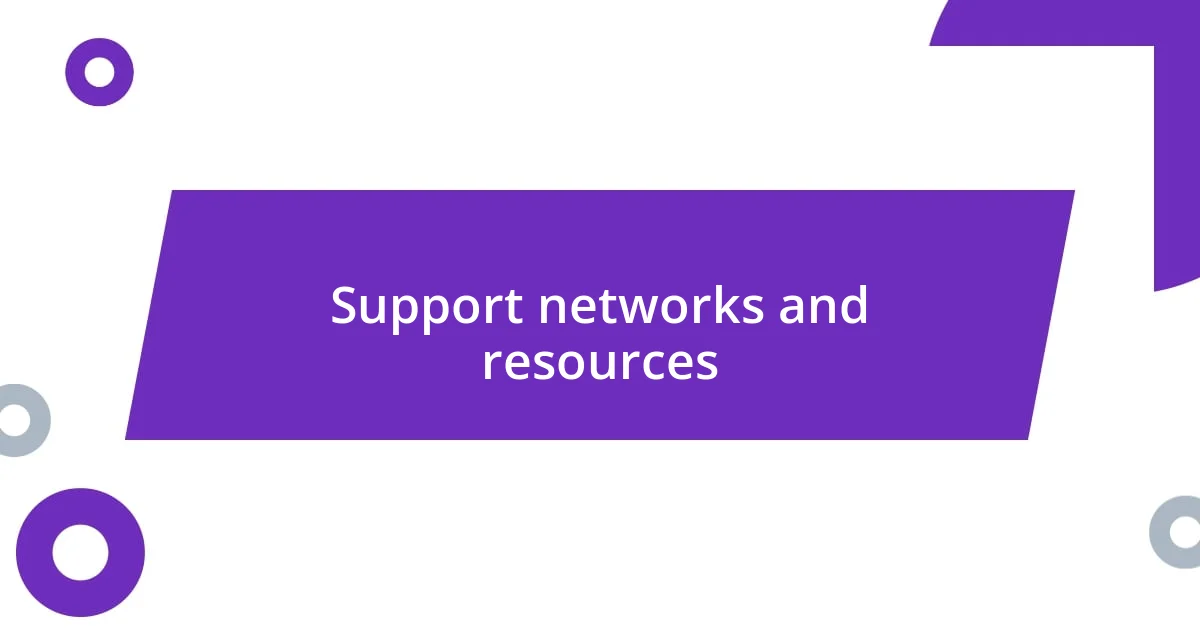
Support networks and resources
Support networks and resources are indispensable when navigating the complexities of genetic disorders. I remember attending a local support group for families dealing with similar conditions. Listening to others share their stories was not just comforting; it opened my eyes to a wider array of resources available—everything from mental health professionals to specialized websites dedicated to rare genetic disorders. Have you ever found unexpected support in a community?
Using online platforms also became a lifeline for me. I discovered forums where individuals openly discussed their experiences, and the sense of camaraderie was refreshing. There was one post that particularly resonated with me—a mother sharing how she advocated for her child’s treatment plan. Her bravery highlighted the importance of not just finding support, but being an advocate and resource for others as well. I think that mutual support creates a beautiful ripple effect, don’t you?
Additionally, various organizations dedicated to genetic disorders offer invaluable resources—from educational materials to counseling services. I recall reaching out to a non-profit that provided guidance on navigating insurance for genetic testing. They had representatives who patiently walked me through the process, answering all my concerns. I was struck by their commitment to helping individuals like me. Wouldn’t it be amazing if everyone facing a genetic disorder had access to such dedicated support?
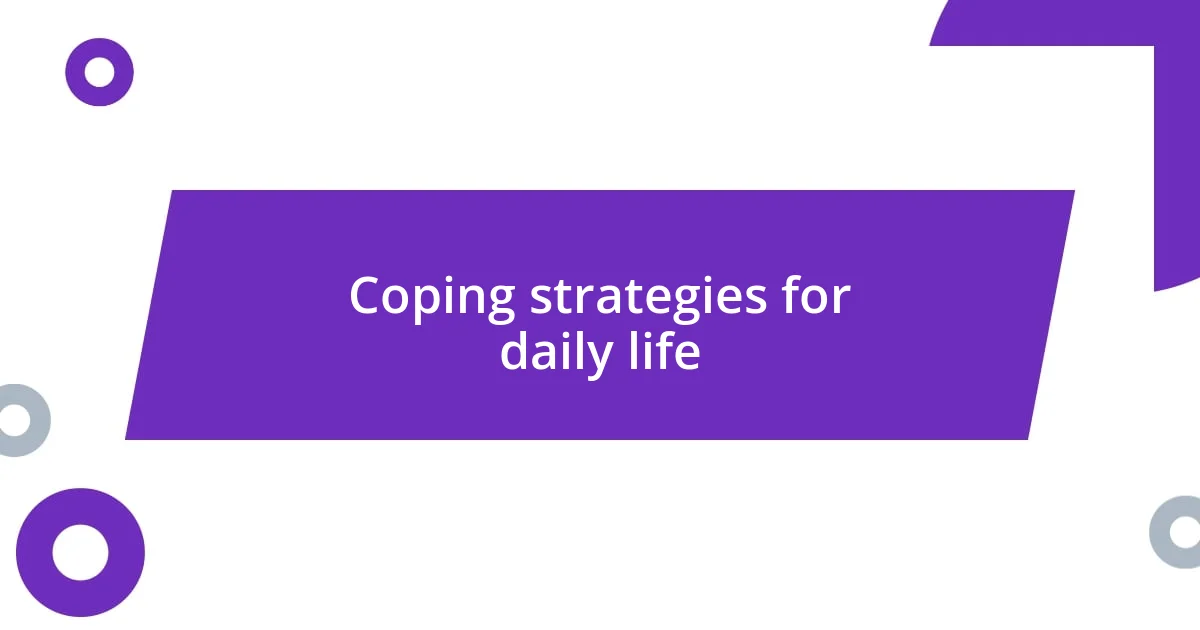
Coping strategies for daily life
Living with a genetic disorder means adapting to a new reality every day. I remember those mornings when I’d wake up feeling overwhelmed by discomfort, unsure if I could tackle even the simplest tasks. I found that breaking down my day into manageable pieces helped. For instance, I’d prioritize what truly needed to get done and give myself permission to take breaks, reminding myself that it’s okay to pace myself.
Another coping strategy that transformed my daily life was implementing a structured routine. Establishing a consistent schedule not only provided stability but also helped me to mentally prepare for what lay ahead. I often set aside time for relaxation and self-care, which felt crucial for my mental well-being. Have you ever experimented with a routine that just clicked for you? When I finally did, it felt like a light bulb went off—it made everything more manageable.
Lastly, I discovered the power of mindfulness and gratitude. Each evening, I started noting down a few things I was grateful for, however small they seemed. This practice kept me grounded and shifted my focus away from the struggles to the joys that still existed in my life. I often wonder if others have found similar solace in simple acts like this. Just recognizing those moments of happiness can be a powerful antidote to the challenges we face.












